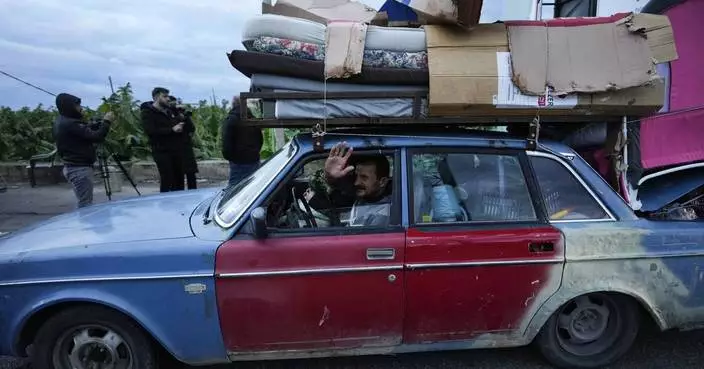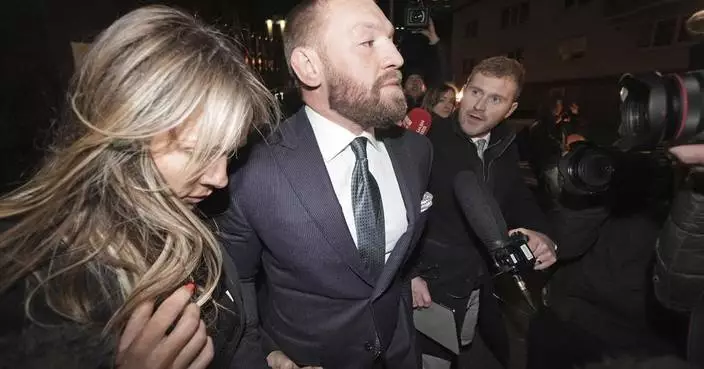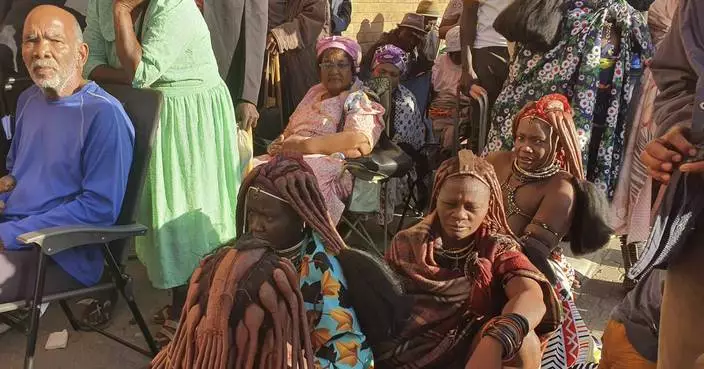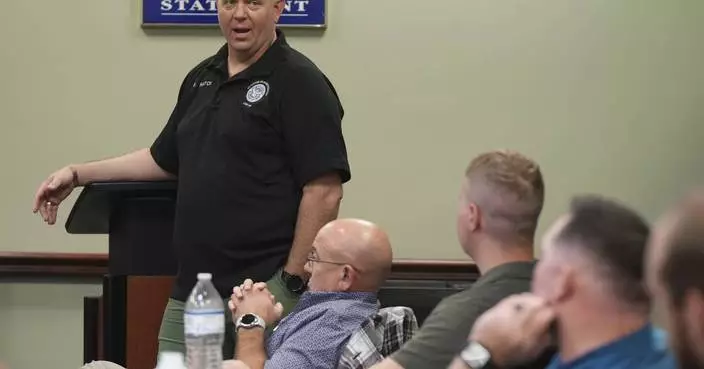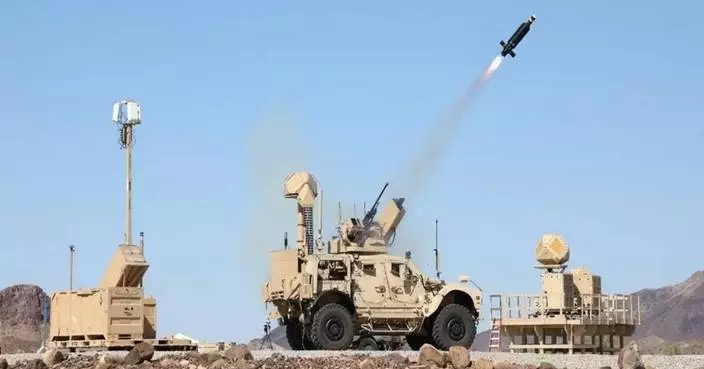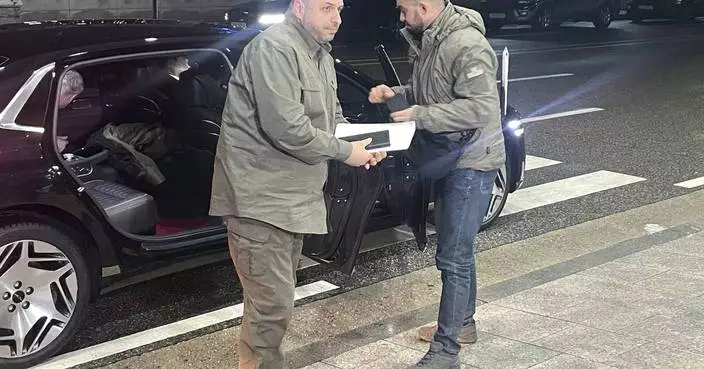PARIS (AP) — Marine Le Pen’s trial is ending with one key question: will France’s leading far-right figure be able to run in the next presidential race?
Her lawyer spoke Wednesday for the last time at the trial in Paris on charges of embezzling European Parliament funds.
Click to Gallery
Far-right National Rally member and former Europarliament member Jean-Lin Lacapelle arrives at the courtroom for the last day of the trial on charges of embezzling European Parliament funds, Wednesday, Nov. 27, 2024 in Paris. (AP Photo/Aurelien Morissard)
Louis Aliot, a member of the far-right National Rally party, arrives at the courtroom for the last day of the trial on charges of embezzling European Parliament funds, Wednesday, Nov. 27, 2024 in Paris. (AP Photo/Aurelien Morissard)
French far-right leader Marine Le Pen arrives at the courtroom for the last day of the trial on charges of embezzling European Parliament funds, Wednesday, Nov. 27, 2024 in Paris. (AP Photo/Aurelien Morissard)
French far-right leader Marine Le Pen arrives at the courtroom for the last day of the trial on charges of embezzling European Parliament funds, Wednesday, Nov. 27, 2024 in Paris. (AP Photo/Aurelien Morissard)
French far-right leader Marine Le Pen arrives at the courtroom for the last day of the trial on charges of embezzling European Parliament funds, Wednesday, Nov. 27, 2024 in Paris. (AP Photo/Aurelien Morissard)
The Paris court is expected to render its verdict in the spring of next year. It could declare Le Pen ineligible to seek public office if it finds her guilty. That could throw her political future into disarray and upend the election race to succeed President Emmanuel Macron, scheduled in 2027.
Le Pen's National Rally party and 25 of its officials, including her, are accused of having used money intended for European Union parliamentary aides to pay instead staff who worked for the party between 2004 and 2016, violating the 27-nation bloc’s regulations. The National Rally was called the National Front at the time.
Le Pen and other co-defendants denied wrongdoing.
Paris prosecutors have requested a 2-year prison sentence for Le Pen. In addition, they asked for a 5-year period of ineligibility to run for office “with immediate effectiveness" — independent of whether she files an appeal or not.
Such a verdict would be the worst-case scenario for Le Pen.
Le Pen’s lawyer, Rodolphe Bosselut, said Wednesday his client pleaded “not guilty.”
He said he would seek to convince the court that Le Pen's actions “were ordinary, trivial, practiced by all European similar opposition parties… and with no fraudulent intent, precisely because it was considered accepted and not prohibited.”
Bosselut also said the prosecutors' requests were like “a weapon of mass destruction of the democratic game," adding that a decision barring Le Pen from running for office would have “irremediable, irreparable consequences."
For over a decade, Le Pen has worked at making her party more mainstream, dulling its extremist edge to broaden its appeal to voters.
She has already positioned herself as a candidate to succeed Macron, having finished runner-up to him in 2017 and 2022.
But the trial could prove to be a major and possibly decisive hurdle.
Le Pen appeared in recent weeks to anticipate a guilty verdict, telling the panel of three judges: “I feel we didn’t succeed in convincing you.”
In court, Le Pen has been a forceful presence. Outside the courtroom, she's repeatedly expressed irritation at charges she says are unfounded.
A measure of the potential gravity of the case for Le Pen is the time and energy she has devoted to the hearings. She often stayed late into the night as nitty-gritty courtroom debates about the role and financing of parliamentary aides dragged on.
Le Pen argued all the work done by aides was justified and above board. She said their missions had to be adapted to the MEPs’ various activities, including some highly political tasks related to the party.
Prosecutors spoke of the “unprecedented” dimension of the alleged embezzlement and its "organized, maximized, systemic and systematic nature.”
They alleged that Le Pen was central in what they called a “system” for her party to “save money at the expense of the European Parliament.”
They also said some of the well-paid jobs contributed to finance the “comfortable lifestyle” of Le Pen’s family and friends.
“They made from the European Parliament their cash cow,” prosecutor Louise Neyton said. “If the Parliament had not rung the bell, they would have continued.”
“Their only regret is they have been caught!"
Hearings showed that some EU money was used to pay for Le Pen’s bodyguard — who before used to be her father’s bodyguard — as well as her personal assistant.
Le Pen’s sister, Yann, is also accused of having been paid as an EU parliamentary aide when she was instead in charge of organizing the party’s big events.
Others worked as aides to party officials they had no employment contract with.
Prosecutor Nicolas Barret acknowledged that a verdict rendering Le Pen ineligible to seek public office is "not without consequences, obviously for those convicted, but also for (France's) public and democratic life.”
Yet the judicial authority “merely takes note of fraudulent behavior and is not at the origin of the situation,” he insisted.
Prosecutors requested a guilty verdict for all of Le Pen's co-defendants, including various sentences of up to one year in prison and a 2-million euro fine for the party.
A potential appeal could lead to another trial for the case in 2026 — just before the next presidential race.
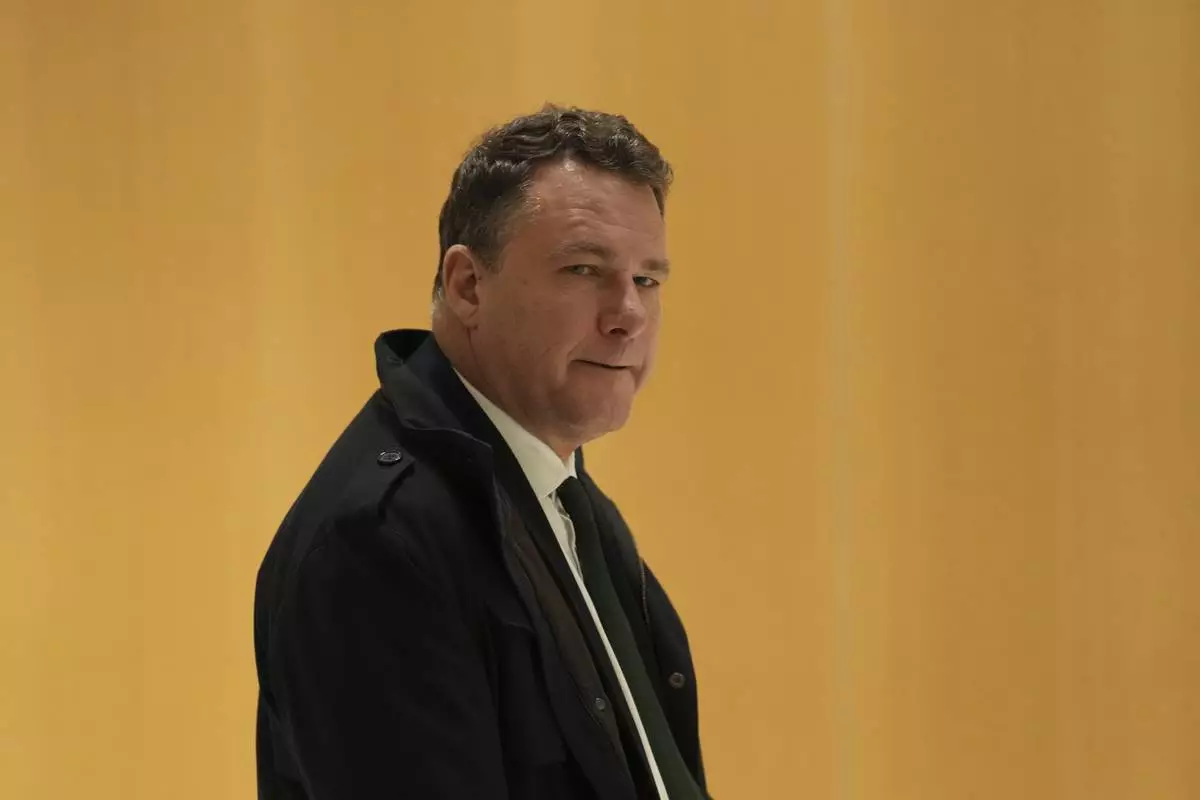
Far-right National Rally member and former Europarliament member Jean-Lin Lacapelle arrives at the courtroom for the last day of the trial on charges of embezzling European Parliament funds, Wednesday, Nov. 27, 2024 in Paris. (AP Photo/Aurelien Morissard)
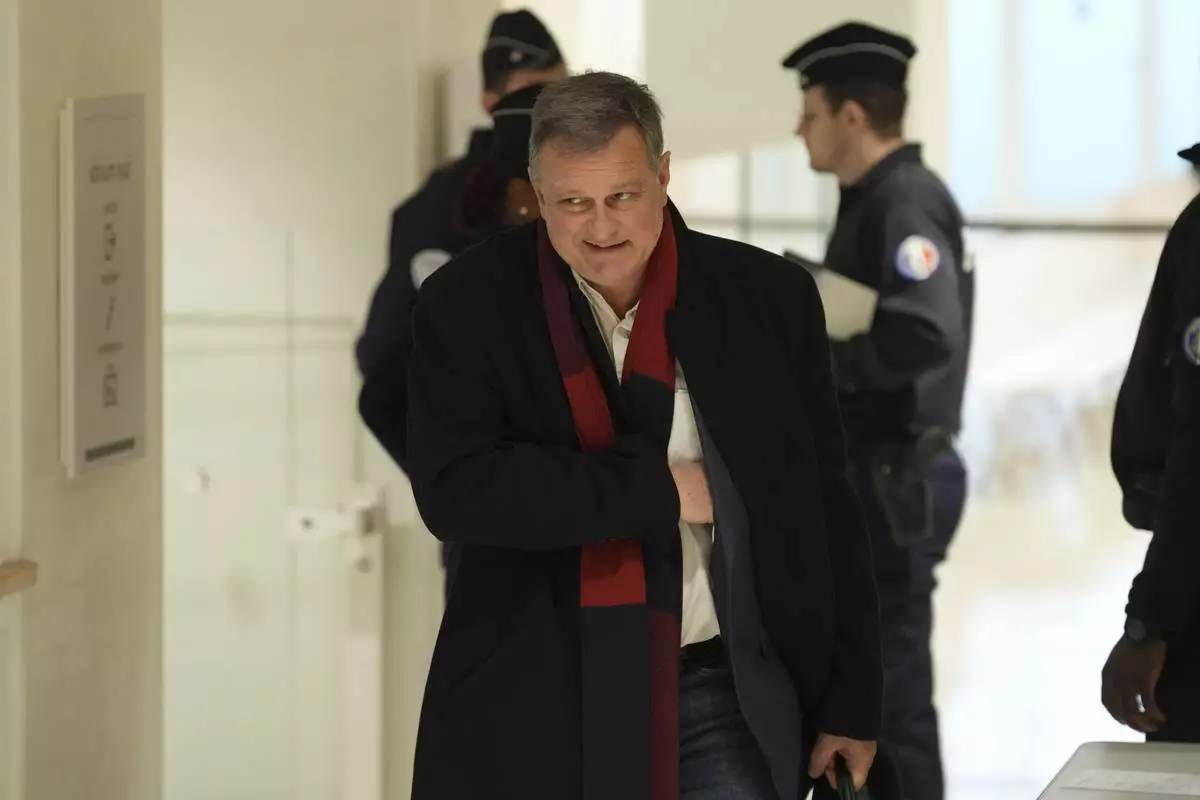
Louis Aliot, a member of the far-right National Rally party, arrives at the courtroom for the last day of the trial on charges of embezzling European Parliament funds, Wednesday, Nov. 27, 2024 in Paris. (AP Photo/Aurelien Morissard)
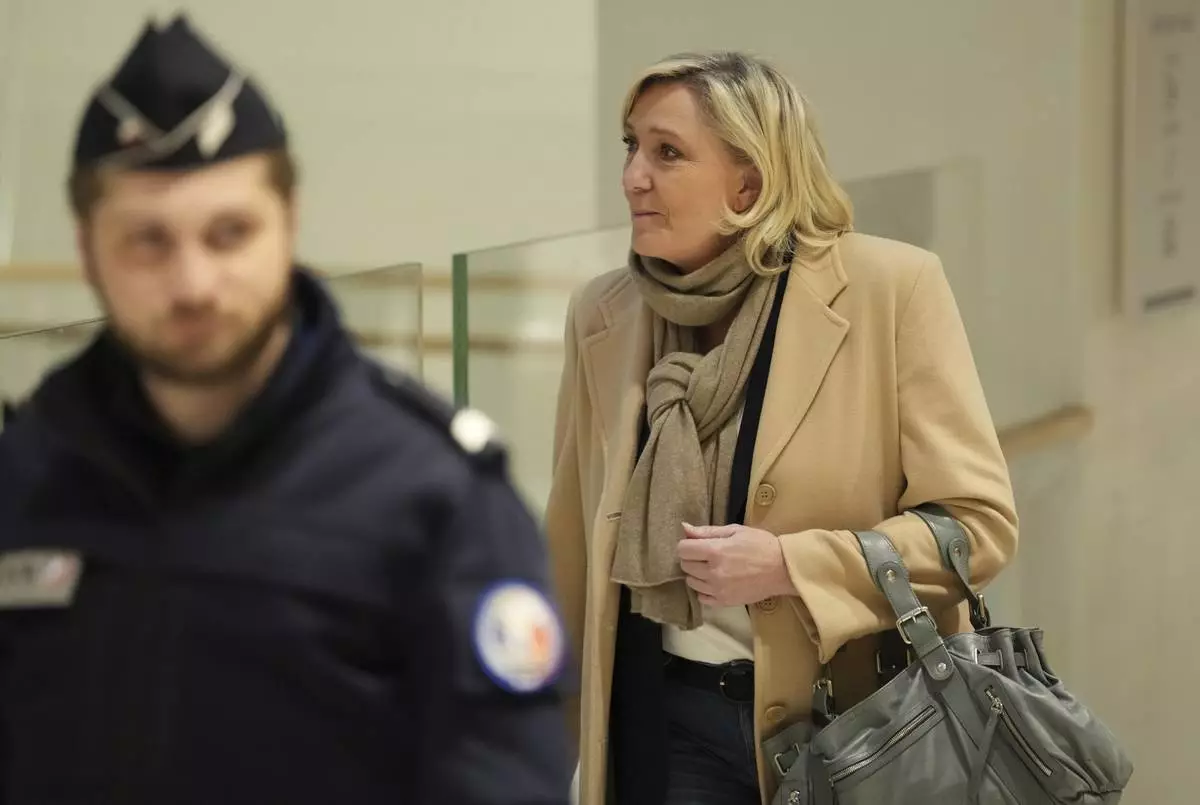
French far-right leader Marine Le Pen arrives at the courtroom for the last day of the trial on charges of embezzling European Parliament funds, Wednesday, Nov. 27, 2024 in Paris. (AP Photo/Aurelien Morissard)
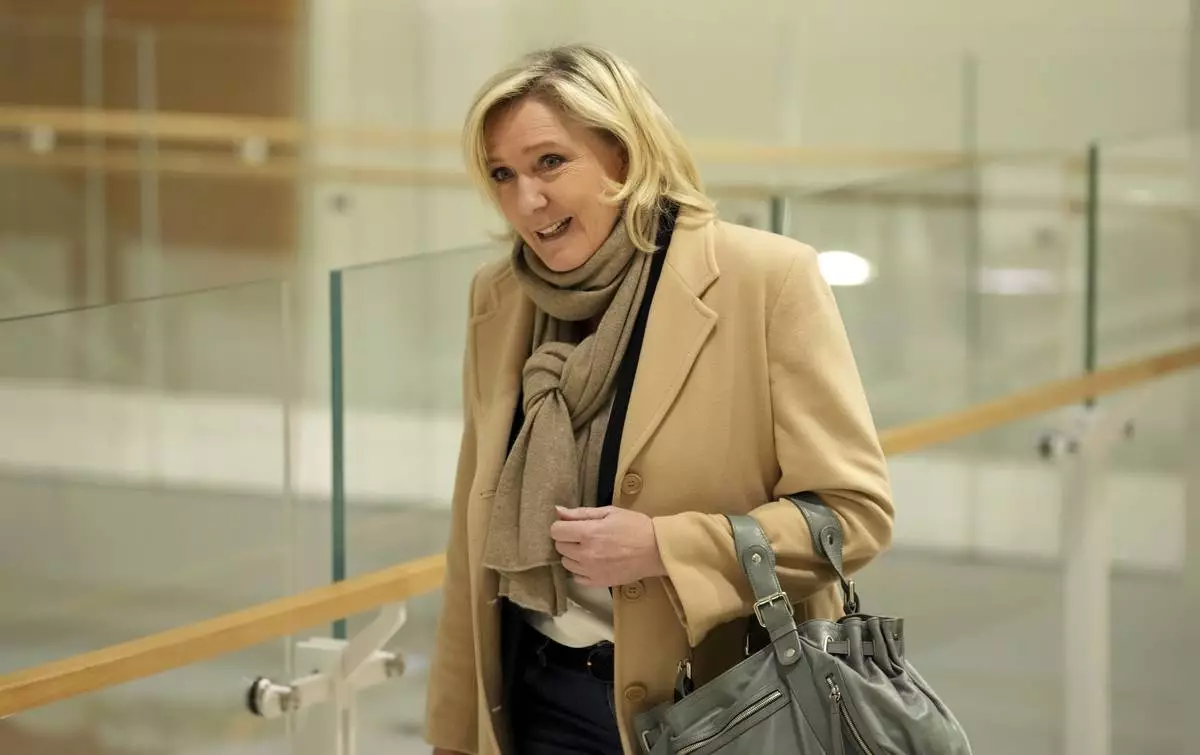
French far-right leader Marine Le Pen arrives at the courtroom for the last day of the trial on charges of embezzling European Parliament funds, Wednesday, Nov. 27, 2024 in Paris. (AP Photo/Aurelien Morissard)
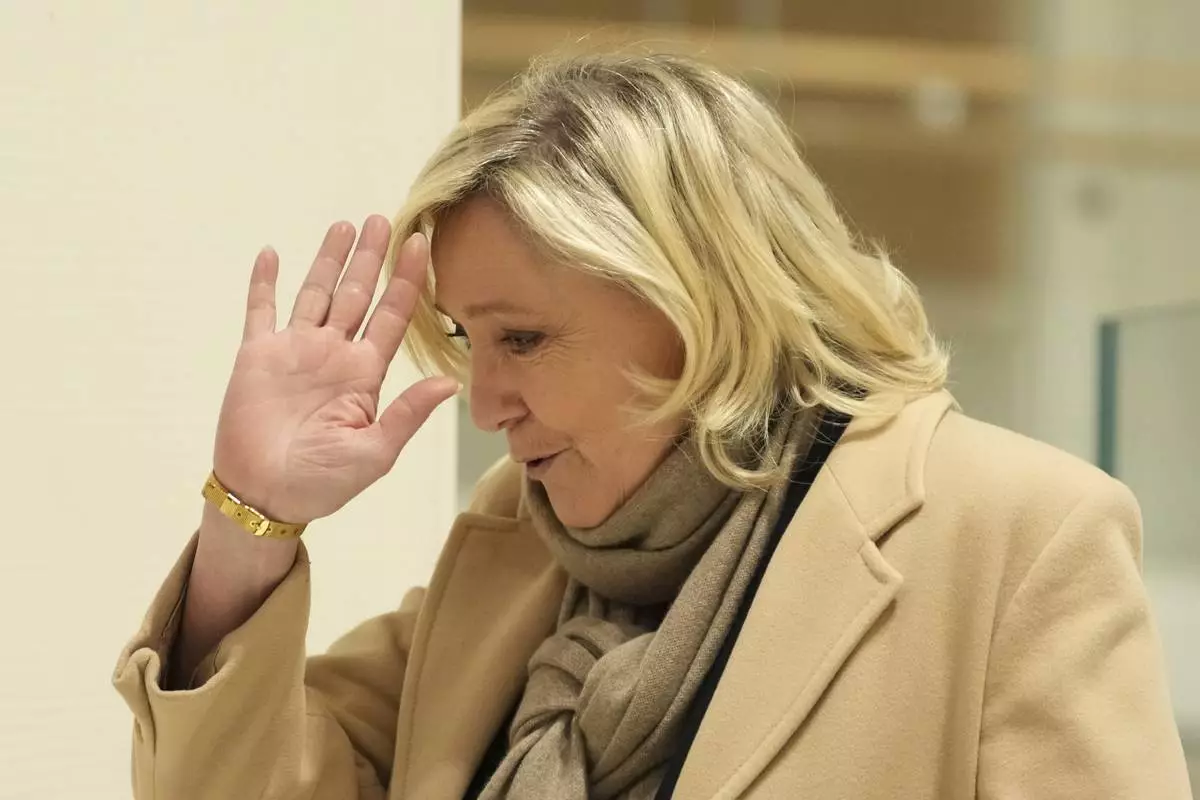
French far-right leader Marine Le Pen arrives at the courtroom for the last day of the trial on charges of embezzling European Parliament funds, Wednesday, Nov. 27, 2024 in Paris. (AP Photo/Aurelien Morissard)
TYRE, Lebanon (AP) — A ceasefire between Israel and the Lebanese militant group Hezbollah that began Wednesday appeared to be holding, as residents in cars heaped with belongings streamed back toward southern Lebanon despite warnings from Israeli and Lebanese troops that they stay away from certain areas.
If it holds, the ceasefire would bring an end to nearly 14 months of fighting between Israel and Hezbollah, which escalated in mid-September into all-out war and threatened to pull Hezbollah's patron, Iran, and Israel's closest ally, the United States, into a broader conflagration.
The deal does not address the war in Gaza., where Israeli strikes overnight on two schools-turned-shelters in Gaza City killed 11 people, including four children, according to hospital officials. Israel said one of the strikes targeted a Hamas sniper, without commenting on the other one.
The truce in Lebanon could give some reprieve to the 1.2 million Lebanese displaced by the fighting and the tens of thousands of Israelis who fled their homes along the border.
“They were a nasty and ugly 60 days,” said Mohammed Kaafarani, 59, who was displaced from the Lebanese village of Bidias. “We reached a point where there was no place to hide."
The U.S.- and France-brokered deal, approved by Israel late Tuesday, calls for an initial two-month halt to fighting and requires Hezbollah to end its armed presence in southern Lebanon, while Israeli troops are to return to their side of the border.
Thousands of additional Lebanese troops and U.N. peacekeepers would deploy in the south, and an international panel headed by the United States would monitor compliance.
Israel says it reserves the right to strike Hezbollah should it violate the terms of the deal.
Israel is still fighting Hamas militants in Gaza in response to the group’s cross-border raid into southern Israel in October 2023. But President Joe Biden on Tuesday said his administration would make another push in the coming days to try to renew efforts for a deal in the war-ravaged Palestinian enclave.
Hours after the ceasefire came into effect, thousands of people drove south from Beirut with their belongings and mattresses tied on top of their cars. Traffic was gridlocked at the northern entrance of the port city of Sidon.
“This is a moment of victory, pride and honor for us, the Shiite sect, and for all of Lebanon,” said Hussein Sweidan, a resident returning to the port city of Tyre. He said he saw the ceasefire as a victory for Hezbollah. The Shiite militant group has often faced criticism from members of Lebanon's other religious communities.
Sporadic celebratory gunfire was heard at a main roundabout in the city, as drivers honked their horns and residents cheered.
The Israeli military warned displaced Lebanese not to return to evacuated villages in southern Lebanon, where Israeli troops were still present following the ground invasion in early October. The Israeli military said forces opened fire to push back a number of vehicles that were entering a restricted area.
An Israeli security official said Israeli forces remain in their positions hours after the ceasefire began and will only gradually withdraw.
The official said the pace of the withdrawal and the scheduled return of Lebanese civilians would depend on whether the deal is implemented and enforced. The official was not authorized to discuss the deal and its implementation with the media, and so spoke on condition of anonymity.
The Lebanese military asked displaced people returning to southern Lebanon to avoid frontline villages and towns until Israeli forces withdraw.
Residents will return to vast destruction wrought by the Israeli military during its campaign, which flattened entire villages. The military said it found vast weapons caches and infrastructure it says was meant for Hezbollah to launch an Oct. 7-style attack on northern Israel.
More than 3,760 people have been killed by Israeli fire in Lebanon since the start of the conflict, many of them civilians, according to Lebanese health officials.
In Israel, the mood was far more subdued, with displaced Israelis concerned that the deal did not go far enough to rein in Hezbollah and that it did not address Gaza and the hostages still held there.
“I think it is still not safe to return to our homes because Hezbollah is still close to us,” said Eliyahu Maman, an Israeli displaced from the northern Israeli city of Kiryat Shmona, which is not far from the border with Lebanon and was hit hard by the months of fighting.
On Wednesday morning, Kiryat Shmona remained quiet on a cold, rainy day. A handful of people milled about, inspecting damage from earlier rocket attacks, including to the roof of a bus. The town’s shopping mall, which had been hit before, appeared to have new damage, and a rocket was seen stuck in the ground next to an apartment building.
The fighting killed more than 70 people in Israel, more than half civilians, as well as dozens of Israeli soldiers fighting in southern Lebanon.
A significant return of the displaced to their communities, many of which have suffered extensive damage from rocket fire, could take months.
Israel can claim major victories in the war, including the killing of Hezbollah’s top leader Hassan Nasrallah and most of its senior commanders, as well as the destruction of extensive militant infrastructure. A complex attack involving exploding pagers and walkie-talkies, widely attributed to Israel, appeared to show a remarkable degree of penetration of the secretive militant group.
Hezbollah emerges from the war battered and bloodied, with the reputation it built by fighting Israel to a stalemate in the 2006 war tarnished. Yet its fighters still managed to put up heavy resistance on the ground, slowing Israel’s advance while continuing to fire scores of rockets, missiles and drones across the border each day.
Chehayeb reported from Beirut. Goldenberg reported from Tel Aviv, Israel. Associated Press journalists Alon Bernstein in Haifa, Israel, Leo Correa in Kiryat Shmona, Israel, and Josef Federman in Jerusalem contributed to this report.
Find more of AP’s war coverage at https://apnews.com/hub/israel-hamas-war
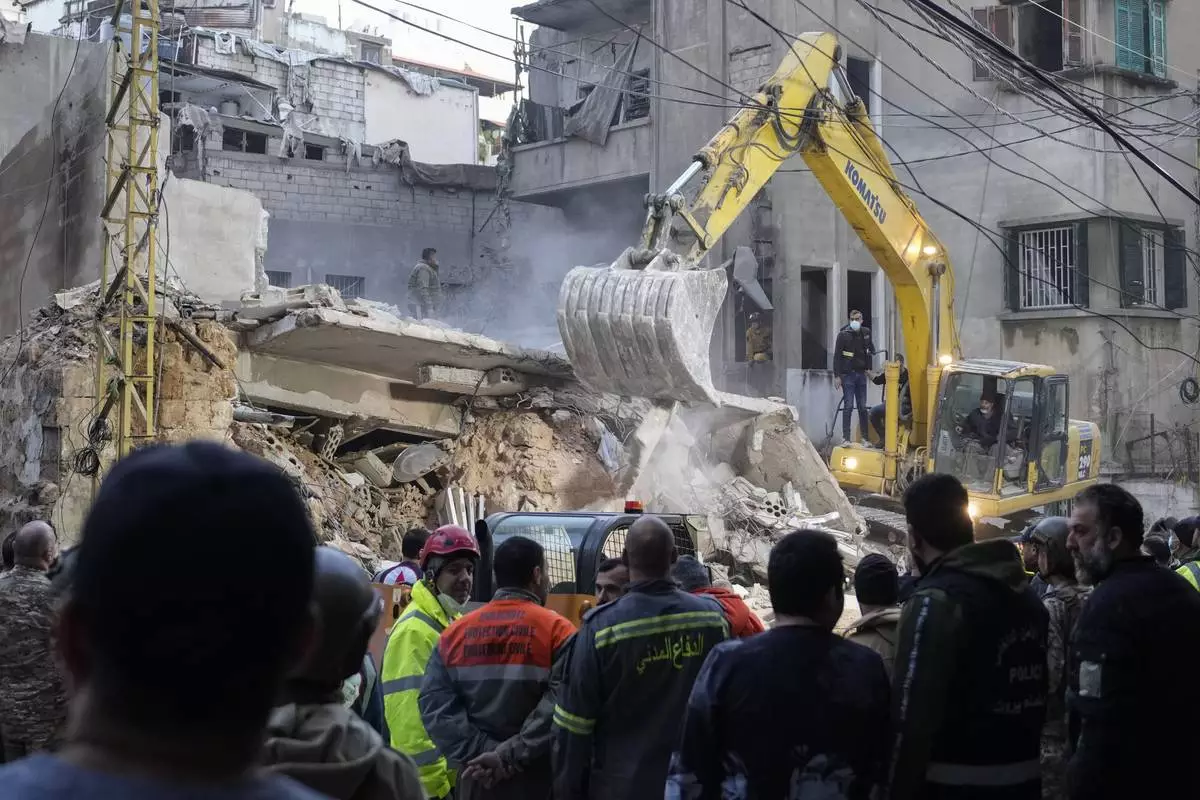
Rescuers use an excavator as they search for victims at the site of an Israeli airstrike that hit a building in Beirut, Tuesday, Nov. 26, 2024. (AP Photo/Hassan Ammar)
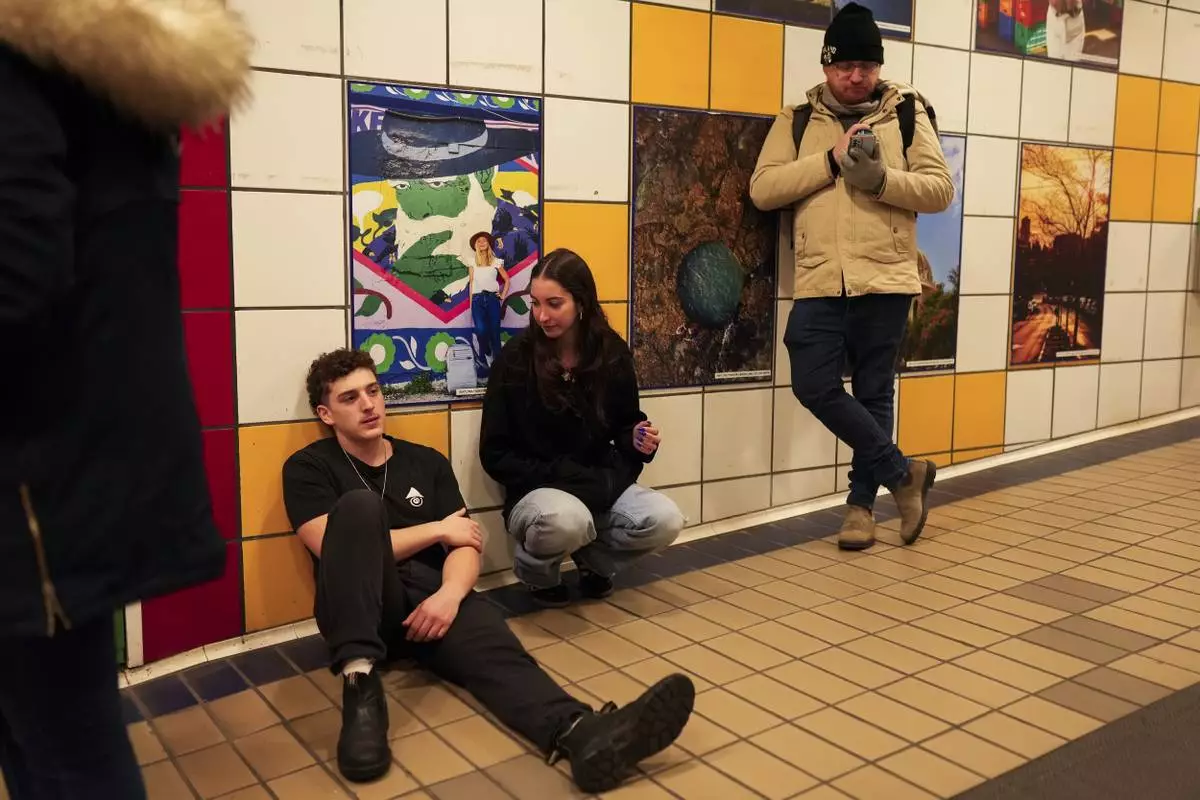
People take shelter in a metro station as a siren sounds a warning of incoming rockets from Lebanon in Haifa, Tuesday, Nov. 26, 2024. (AP Photo/Francisco Seco)
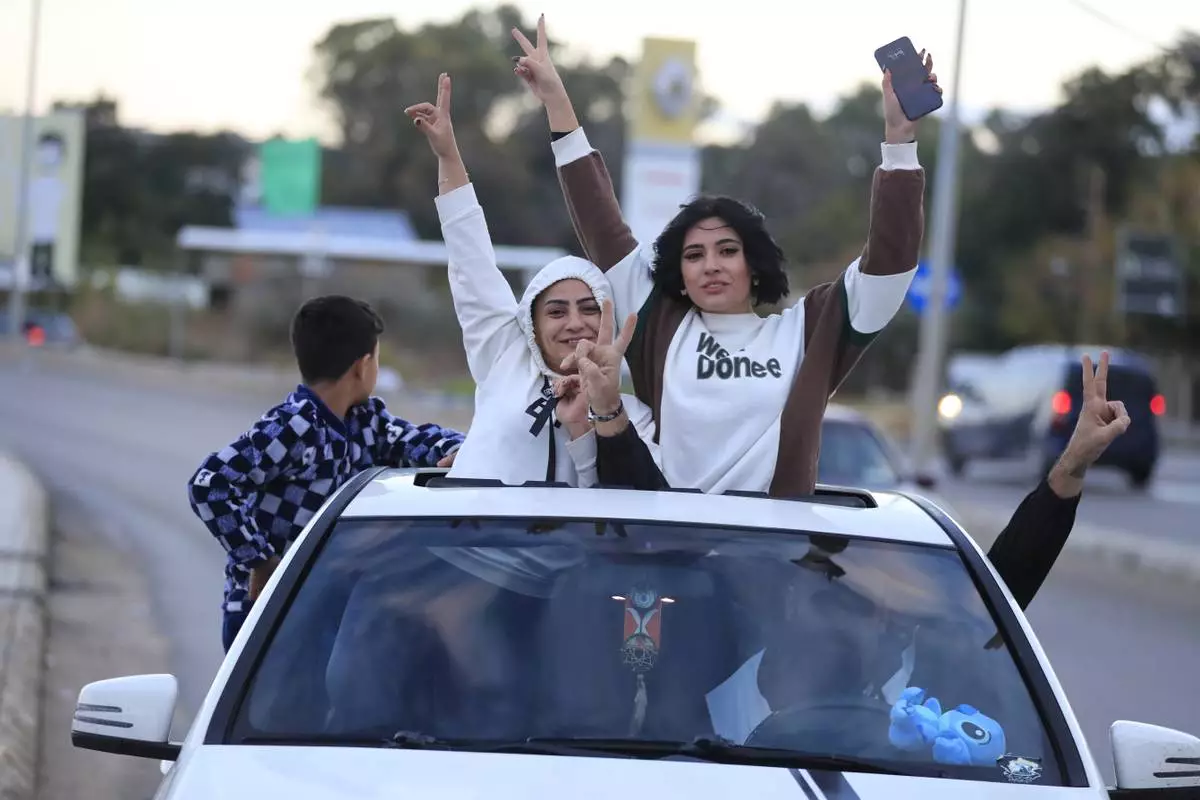
People celebrate after a ceasefire between Israel and Hezbollah went into effect in Sidon, Lebanon, Wednesday, Nov. 27, 2024. (AP Photo/Mohammed Zaatari)
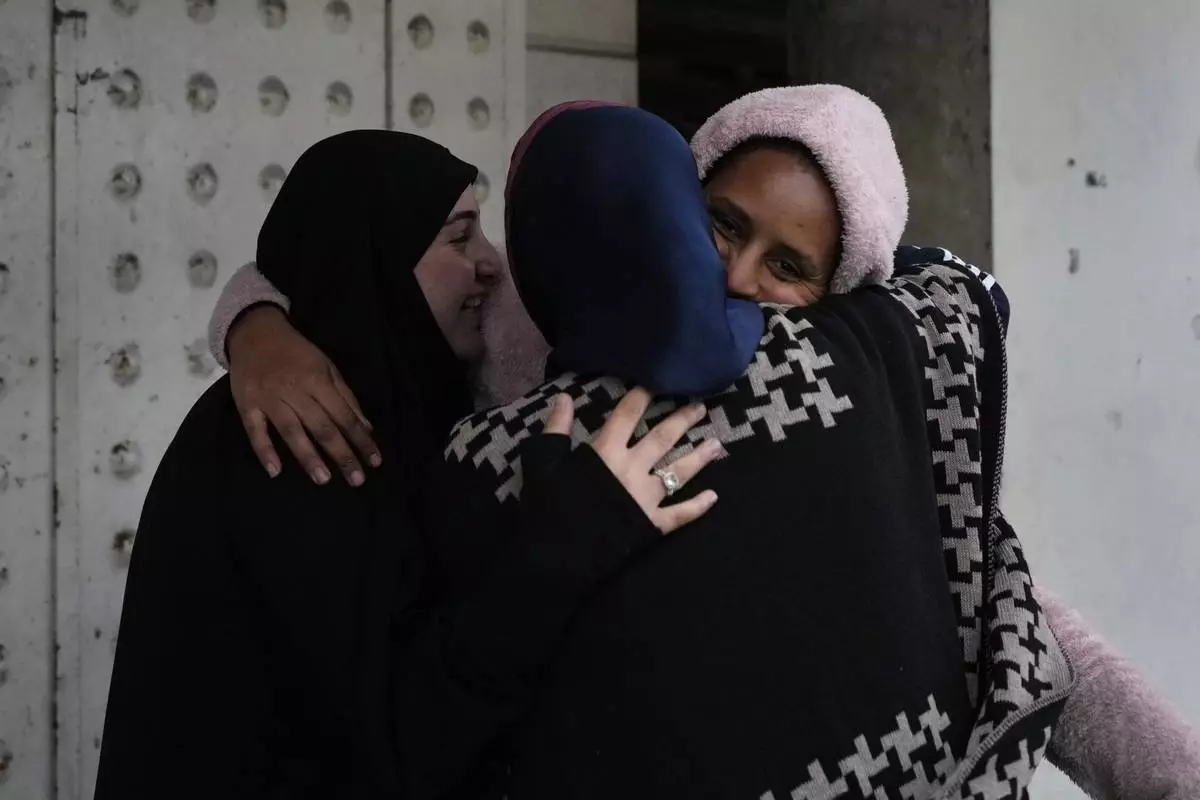
People hug each other upon their arrival at their neighborhood as they celebrate a ceasefire between Hezbollah and Israel, which began early morning, in Tyre, south Lebanon, Wednesday, Nov. 27, 2024. (AP Photo/Hussein Malla)
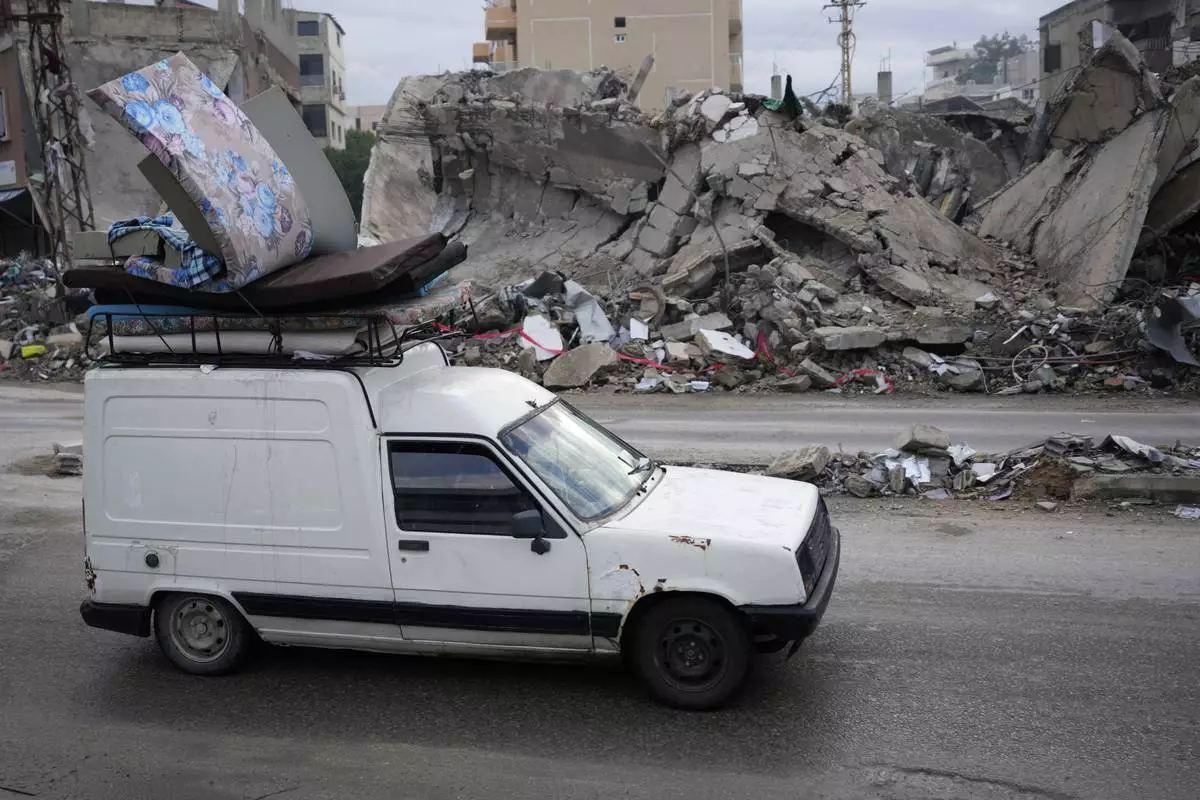
People in a car return back to their villages with their belongings after a ceasefire between Hezbollah and Israel began early morning, as they pass in front of a destroyed building that was hit in an Israeli airstrike, in Tyre, south Lebanon, Wednesday, Nov. 27, 2024. (AP Photo/Hussein Malla)
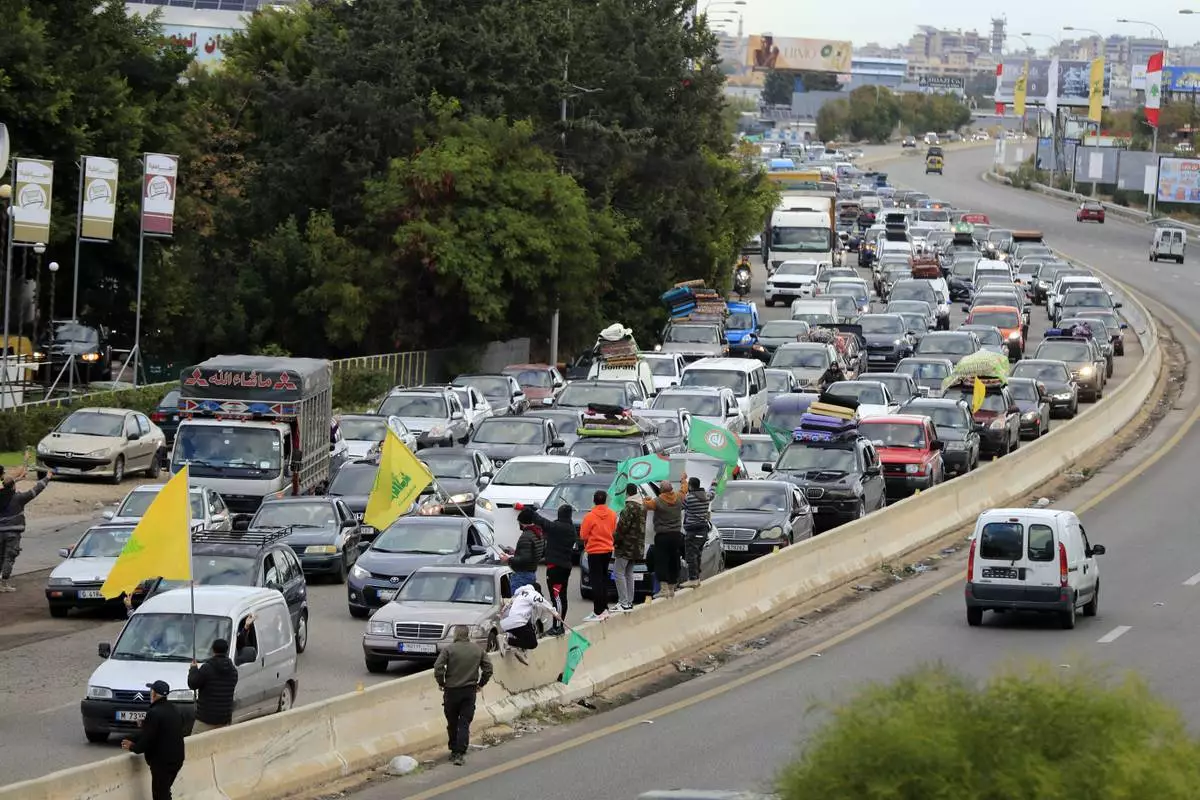
People sit in traffic as they return to their villages after a ceasefire between Israel and Hezbollah went into effect in Ghazieh, Lebanon, Wednesday, Nov. 27, 2024. (AP Photo/Mohammed Zaatari)
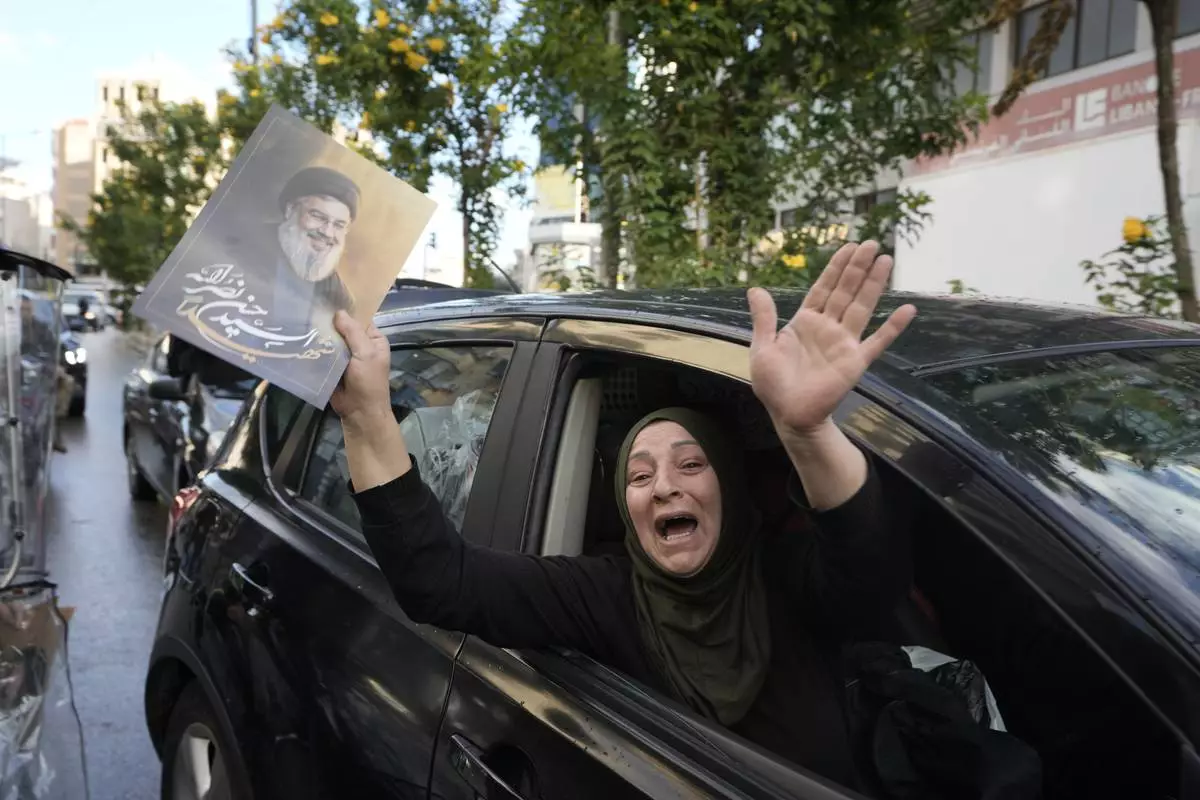
A woman carries a picture of slain Hezbollah leader Hassan Nasrallah as she returns to Dahiyeh, in Beirut, Lebanon, following a ceasefire between Israel and Hezbollah, Wednesday, Nov. 27, 2024. (AP Photo/Bilal Hussein)
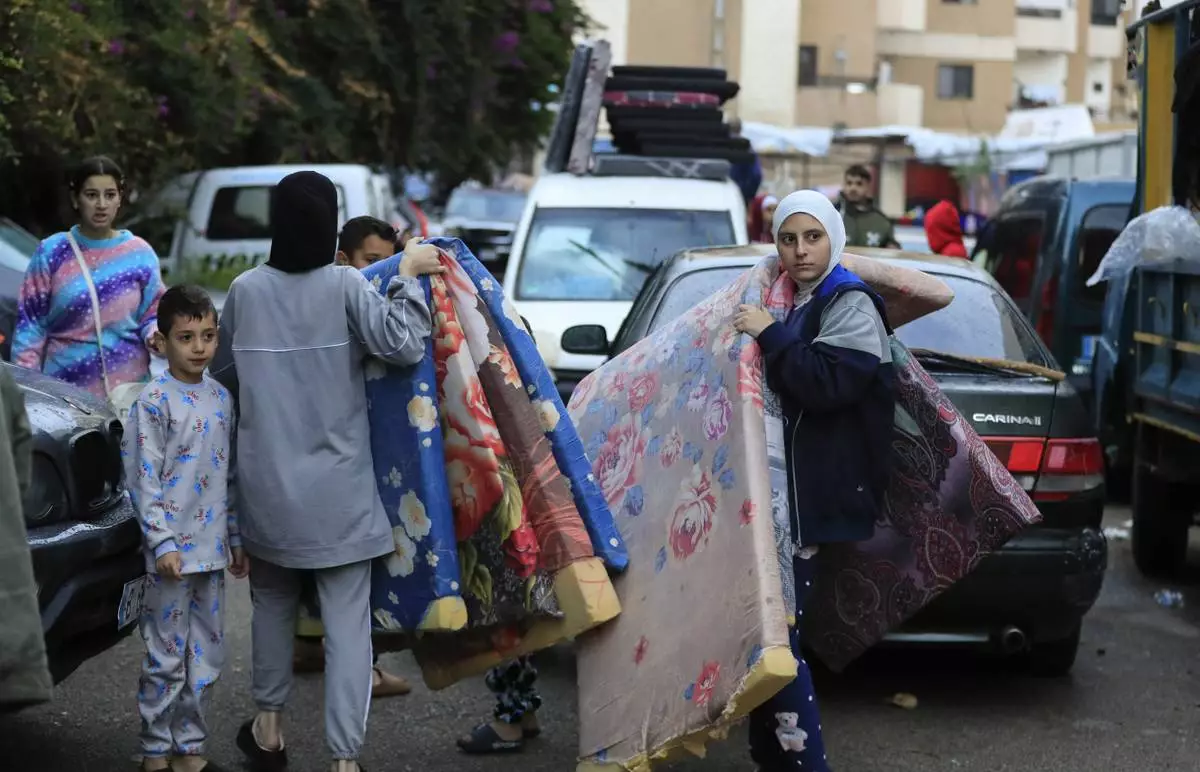
Displaced families carry mattresses as they prepare to return to their villages after a ceasefire between Israel and Hezbollah went into effect in Sidon, Lebanon, Wednesday, Nov. 27, 2024. (AP Photo/Mohammed Zaatari)





















